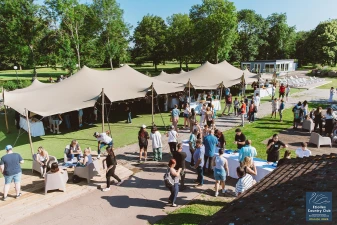Organising a seminar is an excellent way of bringing staff together around common objectives. Whether it's to promote learning, strengthen team cohesion or share a strategic vision, a well-designed seminar can provide a real boost to your image and performance. However, its success depends on rigorous planning, an engaging programme and effective management of the logistical aspects. Discover the essential steps to ensure the success of your corporate event.
Why organise a seminar?
A seminar is a real performance driver, and an ideal opportunity to bring your staff and/or customers together around relevant themes.
Encourage learning and skills development
A seminar is a unique opportunity to pass on knowledge and enhance participants' skills. Whether it's a specific training course or a sector update, this event enables learning that is both targeted and effective.
Strengthen collaboration and exchanges between participants

Seminars encourage interaction between colleagues or partners. They encourage discussion, the sharing of experiences and teamwork, strengthening cohesion and motivation throughout the group. Through seminars or residential seminars, you promote inclusion within a company.
Promote a strategic vision or a new project

It's also an opportunity to present a new strategy, an ambitious project or to align teams around common objectives. When well designed, your seminar is an exceptional tool for facilitating buy-in and commitment.
The key stages in organising a successful seminar

Define the objectives of the seminar
Before getting started, ask yourself what you want to achieve with this event: is it a training course, a networking opportunity, a strategic retreat? These objectives must be aligned with the needs of the participants, always with a positive view of your company.
Identify the target audience

A seminar can be aimed at employees, customers or partners. The content must be adapted to their profile and expectations to guarantee their commitment, satisfaction and positive spin-offs for your company.
Choosing the right date and venue

It's best to choose a time when participants are available. avoid holiday periods or periods when your sector is likely to be under pressure.
As forthe choice of venue, it should meet a number of criteria: accessibility, equipment required and the right atmosphere to achieve the objectives set.
Define a precise budget

The budget must include all expenditure items: venue hire, catering, speakers, communication media, etc. This is where it can be useful to opt for a tailor-made, all-inclusive package, to minimise surprises.
And don't be afraid to leave a margin for unforeseen circumstances.
design a captivating programme
Structure the content of the seminar
Plan speeches linked to the objectives, which will support the arguments you wish to put forward, either directly or indirectly. For example, there's nothing like a workshop that invites your participants to spend a few moments in the shoes of a visually impaired person to "open their eyes" to the day-to-day realities of disability: the perfect way to liven up a CSR-oriented seminar.
It's also a good idea to alternate between theoretical and practical sessions (workshops, round tables) to keep everyone interested.
Invite relevant speakers

Inviting in-house experts or outside speakers can make the content more lively, as well as providing a more in-depth look at the key points. Don't forget to include time for discussion and questions and answers. In this way, you can encourage your guests to communicate with these specialists in greater depth.
Plan interactive activities

Team building, case studies or collaborative brainstorming: favour activities that strengthen commitment and encourage exchanges between participants.
Manage the logistical aspects

Plan the necessary equipment
To ensure that your seminar runs smoothly and enjoyably, it's best to make sure you have the right technology (projectors, microphones, screens) and well thought-out teaching aids. A welcome kit (badges, pens, notebooks) can also be provided, depending on the activities on offer.
Organising reception and registration

A registration system (online form, QR code) is essential so that you know the exact number of participants. On the big day, a warm welcome with a dedicated team will make their experience easier.
Ensuring appropriate catering

Let's not forget the coffee and meal breaks, to ensure that everyone is comfortable and happy. Call in a caterer or opt for a package that includes catering for added convenience.
Communicating effectively about the seminar

Promote the event in advance
Maximise participation in your event by making sure everyone knows about it! Create a dedicated post or communication on your company's internal networks (e-mail, intranet, etc.) and don't hesitate to send out invitations and announcements.don't hesitate to send out invitations and reminders to generate interest in your seminar.
Provide clear, practical information
Purely practical information will also be much appreciated: a detailed programme, a map and transport recommendations are essential. You should also provide a contact person available to answer any questions.
Ensuring that the seminar runs smoothly

Coordinate speakers and highlights
Check that the programme is respected and that the timing does not slip
Lead the sessions to maintain commitment
Manage unforeseen events
Plan back-up solutions for technical breakdowns or absences (e.g. plan to save your communication materials on your computer or on a USB stick in the event of a network breakdown).
Measuring the impact of the seminar
One of the most important aspects of a seminar is to obtain positive spin-offs, which it is crucial to be able to evaluate.
Gathering feedback from participants

An online or on-site satisfaction questionnaire can provide reliable feedback to help you assess the strengths and areas for improvement.
Analyse results in relation to objectives
Satisfaction rates, key learnings and areas for improvement should be analysed to adjust future events. There's no reason why you can't test your staff's new knowledge in a fun way, with an amusing quiz. A debriefing with the organising team will also give you important answers.
Share an assessment with stakeholders
Afterwards, continue to add value to your event by drawing up a clear, concrete report that you can share with the people involved. For example, prepare an analysis report with photos and videos of the highlights.
Call on professionals for a stress-free seminar

Why hire an events agency?
Expertise, experience, saving time and taking care of details, not to mention managing unnecessary expenses that could save you money.
Criteria for choosing a service provider
References, specialisation and suitability for your budget
Are you planning a seminar? Organise a unique, unifying and memorable event that will convey a positive image of your company. At Whereez, unforgettable moments are our speciality.



